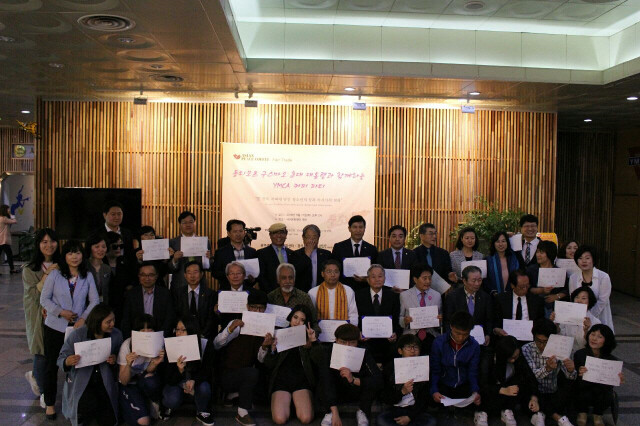hankyoreh
Links to other country sites 다른 나라 사이트 링크
Gwangju groups build solidarity with grassroots groups from around Asia

On the 36th anniversary of the Gwangju Massacre, attention is turning to Gwangju civic groups are working to build solidarity with grassroots organizations and local producers in other Asian countries.
On May 17, the May 18 Memorial Foundation organized an event at the May 18 Memorial Culture Center to collect donations for Asian grassroots organizations.
Participants at the event included delegates from 11 civic groups in seven Asian countries: the Maldives, Bangladesh, Sri Lanka, Indonesia, Myanmar, Thailand and Pakistan. During the event, the delegates talked about their work in the areas of the environment, education, and civic participation.
The Subornogram Foundation is an organization in Bangladesh that works in the areas of education and human rights. The organization provides free education to young people who are marginalized in or excluded from Bangladesh’s public education system, including the children of people in Bangladesh’s houseboats, the children of minority groups in the mountains and poor children.
“During our educational course, our environmental workers were attacked by terrorists while they were preventing the excavation of sand. The sand is the habitat of the fish that people in the houseboats depend on for their livelihood,” the delegate of this organization said.
In addition, there was an educational development foundation in Myanmar that is providing schooling to refugees that have fled to the border with Thailand to escape the oppression of Myanmar’s military government.
Other civic groups attending the event were Indonesian families of the disappeared and democracy networks in other Asian countries.
The May 18 Memorial Foundation’s drive for donations for these 11 Asian civic groups raised US$20,000 from about 50 individuals. People who were touched by the foundation’s campaign to help Asian grassroots groups took the first step of donating to support these groups’ activities.
“When the people who were demanding the truth about the Gwangju Massacre and who were fighting for democratization experienced serious difficulties, they received considerable help from religious and civic groups in Germany, the US and Japan. We think that now Gwangju has an obvious duty to support civic groups in Asia who are currently working for democratization,” said Kim Yeong-rae, permanent director of the May 18 Memorial Foundation.
On Tuesday, Gwangju YMCA hosted a “coffee party” with Xanana Gusm?o, the first president of East Timor, at the first branch of Asian Peace Coffee on the first floor of the Gwangju Seo District Culture Center.
Asia Peace Coffee opened in June of last year as a place for school dropouts to get work experience. The coffee shop is a free trade business that provides customers with high-quality coffee made with beans grown in East Timor to help local producers become self-sufficient.
In order to expand its support for fair trade and to help more out-of-school teenagers get back on their feet, Gwangju YMCA plans to open two more branches this year, one in the Youth Life Design Center and another in the Gwangsan District Office Youth Center.
By Jung Dae-ha, Gwangju correspondent
Please direct questions or comments to [english@hani.co.kr]

Editorial・opinion
![[Editorial] Intensifying US-China rivalry means Seoul must address uncertainty with Beijing sooner than later [Editorial] Intensifying US-China rivalry means Seoul must address uncertainty with Beijing sooner than later](https://flexible.img.hani.co.kr/flexible/normal/500/300/imgdb/original/2024/0517/8117159322045222.jpg) [Editorial] Intensifying US-China rivalry means Seoul must address uncertainty with Beijing sooner than later
[Editorial] Intensifying US-China rivalry means Seoul must address uncertainty with Beijing sooner than later![[Column] When ‘fairness’ means hate and violence [Column] When ‘fairness’ means hate and violence](https://flexible.img.hani.co.kr/flexible/normal/500/300/imgdb/original/2024/0516/7417158465908824.jpg) [Column] When ‘fairness’ means hate and violence
[Column] When ‘fairness’ means hate and violence- [Editorial] Yoon must stop abusing authority to shield himself from investigation
- [Column] US troop withdrawal from Korea could be the Acheson Line all over
- [Column] How to win back readers who’ve turned to YouTube for news
- [Column] Welcome to the president’s pity party
- [Editorial] Korea must respond firmly to Japan’s attempt to usurp Line
- [Editorial] Transfers of prosecutors investigating Korea’s first lady send chilling message
- [Column] Will Seoul’s ties with Moscow really recover on their own?
- [Column] Samsung’s ‘lost decade’ and Lee Jae-yong’s mismatched chopsticks
Most viewed articles
- 1[Editorial] Transfers of prosecutors investigating Korea’s first lady send chilling message
- 2[Exclusive] Unearthed memo suggests Gwangju Uprising missing may have been cremated
- 3[Column] US troop withdrawal from Korea could be the Acheson Line all over
- 4[Editorial] Intensifying US-China rivalry means Seoul must address uncertainty with Beijing sooner t
- 5Xi, Putin ‘oppose acts of military intimidation’ against N. Korea by US in joint statement
- 6[Column] When ‘fairness’ means hate and violence
- 7‘Shot, stabbed, piled on a truck’: Mystery of missing dead at Gwangju Prison
- 8China calls US tariffs ‘madness,’ warns of full-on trade conflict
- 9Seoul government announces comprehensive measures to prevent lonely deaths
- 10Records show how America stood back and watched as Gwangju was martyred for Korean democracy